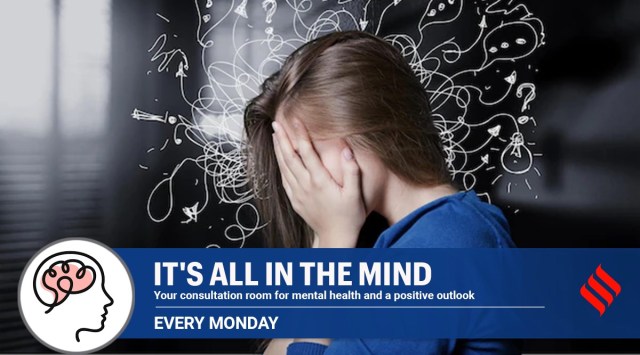OCD is curable: How Veena, who couldn’t stop washing her hands since Covid and kept away from husband, overcame it with therapy
Research has shown that the cause of OCD (obsessive compulsive disorder) involves a combination of neurobiological, genetic and environmental factors. Certain areas of the brain, imbalances in brain chemicals, childhood infections and stressful/traumatic life events play a role in the development of OCD, says Dr Shaunak Ajinkya, Consultant, Psychiatrist, Kokilaben Dhirubhai Ambani Hospital Mumbai
 Obsessive-Compulsive Disorder (OCD) is a mental health condition characterised by obsessions and compulsions. (Source: Freepik)
Obsessive-Compulsive Disorder (OCD) is a mental health condition characterised by obsessions and compulsions. (Source: Freepik) “Doctor, I just can’t stop washing my hands,” said Veena (name changed), a 37-year-old software engineer. She was a highly skilled individual and passionate about her job, but she was getting increasingly distressed due to her obsessions and compulsions.Veena had been dealing with intrusive thoughts of contracting Covid followed by repetitive handwashing and sanitising. This interfered with her daily life, work performance and relationship with her spouse.
It all started after the lockdown which happened just a few months after her marriage. Veena said she felt overwhelmed, anxious, and helpless hearing the barrage of frightening news reports. She constantly worried about falling ill as she had just moved to a new city along with her husband and there was “no one to look after them” in case they fell ill. This made her wash her hands repeatedly, throughout the day, using specific rituals to ensure that they were “clean enough.” She often spent more than an hour in the washroom each day. She practised “social distancing” at home as according to Veena her husband did not observe “adequate hygiene like her.” It led to marital disharmony as they could not adequately consummate their marriage due to her fear of physical intimacy leading to infections, though no one had suffered from Covid, and all were adequately immunised. Veena’s rituals caused her significant distress and anxiety due to their time-consuming nature and interfered with her work deadlines too. Her friends and colleagues started to “comment” on her behaviour, and so she began to avoid them.
Veena sought therapy on the insistence of her spouse as they were unable to have a baby and her biological clock was ticking. Her husband described Veena as a “perfectionist” and said that she “inherited” these traits from her mother. There was no history of addictions or any significant childhood illnesses.
After the initial interviews and psychological assessments, Veena was diagnosed as having Obsessive-Compulsive Disorder (OCD). The treatment plan included psychotherapy and medications. She had a series of therapy sessions, helping her understand her disorder better and learn ways to manage its symptoms. Exposure and Response Prevention (ERP) and Cognitive Restructuring gradually allowed her to confront her fears (for example, touching doorknobs without washing hands immediately) and refrain from engaging in compulsive behaviours. This helped to reduce the severe anxiety associated with her obsessions. Veena was taught how to challenge and reframe her irrational thoughts, such as recognising that OCD is a medical condition and having intrusive thoughts wouldn’t make her a bad person. A course of SSRI (Selective serotonin reuptake inhibitor) and anxiolytic medications helped Veena to manage her symptoms more effectively. We developed relapse prevention strategies to cope with potential setbacks and stressors. Couple therapy aided in resolving Veena’s conflicts with her spouse. The therapy processes empowered Veena to take control of her life and manage her OCD successfully, allowing her to focus on her career, build meaningful relationships and enjoy a better quality of life. It took time but with consistent support, Veena made significant progress. On her last follow-up, Veena, holding her husband’s hand, exclaimed, “Doctor, I’m pregnant!”
SIGNS AND SYMPTOMS OF OCD
Obsessive-Compulsive Disorder (OCD) is a mental health condition characterised by obsessions and compulsions. People with OCD experience recurrent and distressing thoughts/images/urges called obsessions which trigger intense anxiety and discomfort. They are intrusive, unwanted, disturbing, difficult to control, and typically revolve around specific themes causing significant anxiety and distress.
1) Common obsessions include fears of contamination by germs/dirt/chemicals, intense fears related to certain numbers, extreme fears that life-threatening illnesses/accidents may happen to oneself/loved ones, fears about causing inadvertent harm to self/others, excessive doubts or fears of uncertainty, fears of having disturbing sexual/taboo thoughts, fear of discarding unwanted things and constant need for symmetry/order/exactness.
2) To relieve this anxiety, the person engages in repetitive behaviour or mental action called compulsion. These are aimed at neutralising/reducing the distress caused by obsession. Common compulsions include excessive washing/cleaning, frequent checking (e.g., door-locks/appliances or on loved ones), frequent counting or repeating certain words/phrases/numbers/actions, constantly arranging/organising objects in a specific way, and continually engaging in physical/mental rituals to neutralise the intrusive thoughts (e.g. chanting certain words/phrases repeatedly).
3) The person feels driven to perform the compulsions but the relief is short-lived, and the vicious cycle of obsessions and compulsions continues leading to serious impairment in daily functioning. It significantly interferes with the person’s daily life, affecting work, relationships, and overall well-being. The time-consuming nature of compulsions makes it difficult to focus on tasks, leading to reduced productivity. Social and family life are impacted, as these individuals may avoid certain situations or interactions which trigger their obsessions.
4) Research has shown that the cause of OCD involves a combination of neurobiological, genetic and environmental factors. Certain areas of the brain (orbitofrontal, caudate, cingulate, thalamus), imbalances in brain chemicals (neurotransmitters like serotonin), certain childhood infections and stressful/traumatic life events play a role in the development of OCD. People with relatives having OCD have a higher risk.
Left untreated, OCD can become chronic and severe, leading to debilitating anxiety and suicidal depression. But OCD is a treatable condition, and there are effective therapeutic approaches available. Early intervention is the key to significant improvements and patients can lead fulfilling lives.
HOW TO DEAL WITH OCD
(1) Educate yourself about OCD. Knowledge empowers you to tackle the illness more effectively.
(2) Consult a mental health professional for a proper diagnosis and treatment plan consisting of psychotherapy and/or medications. CBT (Cognitive Behavioural Therapy) is one of the most effective treatments for OCD. It helps to challenge and change the obsessive thought patterns. ERP (Exposure and Response Prevention), a specific type of CBT, helps to resist the urges to perform compulsions. Anti-OCD medications like SSRIs (Selective Serotonin Reuptake Inhibitors) are often used to help manage the symptoms of moderate to severe OCD. Relaxation techniques like deep breathing, muscle relaxation, yoga, meditation, hypnotherapy and mindfulness exercises help to allay anxiety effectively.
(3) Engage in activities that reduce stress and promote well-being, such as getting enough sleep, healthy diet, daily exercise, engaging in hobbies, and spending time with loved ones. Stay away from addictions because substance abuse (e.g., smoking, alcohol, drugs) exacerbates OCD symptoms. Joining support groups or seeking out online communities is also beneficial.
(4) Avoid self-criticism and practise self-compassion. OCD is a medical condition and you are not to blame for having it. Set achievable and realistic goals for yourself. Progress is gradual but it’s essential to take small steps in the right direction.If you, or someone you know, is experiencing symptoms of OCD, seeking help from a mental health professional is crucial. Early intervention and appropriate treatment can significantly improve the management of OCD and enhance the quality of life.
- 01
- 02
- 03
- 04
- 05































